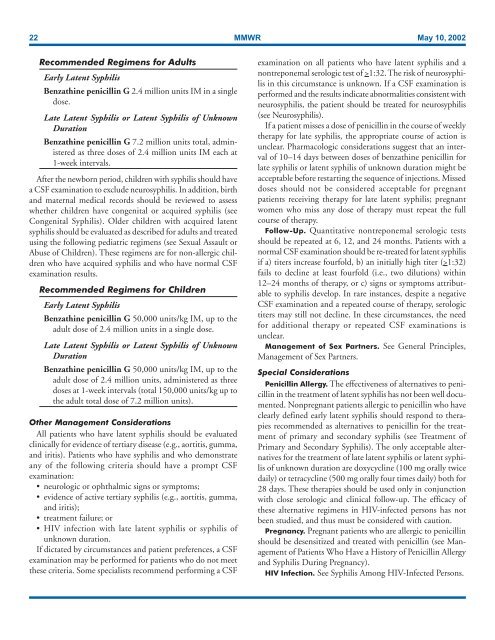You also want an ePaper? Increase the reach of your titles
YUMPU automatically turns print PDFs into web optimized ePapers that Google loves.
22 MMWR May 10, 2002<br />
Recommended Regimens for Adults<br />
Early Latent Syphilis<br />
Benzathine penicillin G 2.4 million units IM in a single<br />
dose.<br />
Late Latent Syphilis or Latent Syphilis of Unknown<br />
Duration<br />
Benzathine penicillin G 7.2 million units total, administered<br />
as three doses of 2.4 million units IM each at<br />
1-week intervals.<br />
After the newborn period, children with syphilis should have<br />
a CSF examination to exclude neurosyphilis. In addition, birth<br />
and maternal medical records should be reviewed to assess<br />
whether children have congenital or acquired syphilis (see<br />
Congenital Syphilis). Older children with acquired latent<br />
syphilis should be evaluated as described for adults and treated<br />
using the following pediatric regimens (see Sexual Assault or<br />
Abuse of Children). These regimens are for non-allergic children<br />
who have acquired syphilis and who have normal CSF<br />
examination results.<br />
Recommended Regimens for Children<br />
Early Latent Syphilis<br />
Benzathine penicillin G 50,000 units/kg IM, up to the<br />
adult dose of 2.4 million units in a single dose.<br />
Late Latent Syphilis or Latent Syphilis of Unknown<br />
Duration<br />
Benzathine penicillin G 50,000 units/kg IM, up to the<br />
adult dose of 2.4 million units, administered as three<br />
doses at 1-week intervals (total 150,000 units/kg up to<br />
the adult total dose of 7.2 million units).<br />
Other Management Considerations<br />
All patients who have latent syphilis should be evaluated<br />
clinically for evidence of tertiary disease (e.g., aortitis, gumma,<br />
and iritis). Patients who have syphilis and who demonstrate<br />
any of the following criteria should have a prompt CSF<br />
examination:<br />
neurologic or ophthalmic signs or symptoms;<br />
evidence of active tertiary syphilis (e.g., aortitis, gumma,<br />
and iritis);<br />
treatment failure; or<br />
HIV infection with late latent syphilis or syphilis of<br />
unknown duration.<br />
If dictated by circumstances and patient preferences, a CSF<br />
examination may be performed for patients who do not meet<br />
these criteria. Some specialists recommend performing a CSF<br />
examination on all patients who have latent syphilis and a<br />
nontreponemal serologic test of >1:32. The risk of neurosyphilis<br />
in this circumstance is unknown. If a CSF examination is<br />
performed and the results indicate abnormalities consistent with<br />
neurosyphilis, the patient should be treated for neurosyphilis<br />
(see Neurosyphilis).<br />
If a patient misses a dose of penicillin in the course of weekly<br />
therapy for late syphilis, the appropriate course of action is<br />
unclear. Pharmacologic considerations suggest that an interval<br />
of 10–14 days between doses of benzathine penicillin for<br />
late syphilis or latent syphilis of unknown duration might be<br />
acceptable before restarting the sequence of injections. Missed<br />
doses should not be considered acceptable for pregnant<br />
patients receiving therapy for late latent syphilis; pregnant<br />
women who miss any dose of therapy must repeat the full<br />
course of therapy.<br />
Follow-Up. Quantitative nontreponemal serologic tests<br />
should be repeated at 6, 12, and 24 months. Patients with a<br />
normal CSF examination should be re-treated for latent syphilis<br />
if a) titers increase fourfold, b) an initially high titer (>1:32)<br />
fails to decline at least fourfold (i.e., two dilutions) within<br />
12–24 months of therapy, or c) signs or symptoms attributable<br />
to syphilis develop. In rare instances, despite a negative<br />
CSF examination and a repeated course of therapy, serologic<br />
titers may still not decline. In these circumstances, the need<br />
for additional therapy or repeated CSF examinations is<br />
unclear.<br />
Management of Sex Partners. See General Principles,<br />
Management of Sex Partners.<br />
Special Considerations<br />
Penicillin Allergy. The effectiveness of alternatives to penicillin<br />
in the treatment of latent syphilis has not been well documented.<br />
Nonpregnant patients allergic to penicillin who have<br />
clearly defined early latent syphilis should respond to therapies<br />
recommended as alternatives to penicillin for the treatment<br />
of primary and secondary syphilis (see Treatment of<br />
Primary and Secondary Syphilis). The o<strong>nl</strong>y acceptable alternatives<br />
for the treatment of late latent syphilis or latent syphilis<br />
of unknown duration are doxycycline (100 mg orally twice<br />
daily) or tetracycline (500 mg orally four times daily) both for<br />
28 days. These therapies should be used o<strong>nl</strong>y in conjunction<br />
with close serologic and clinical follow-up. The efficacy of<br />
these alternative regimens in HIV-infected persons has not<br />
been studied, and thus must be considered with caution.<br />
Pregnancy. Pregnant patients who are allergic to penicillin<br />
should be desensitized and treated with penicillin (see Management<br />
of Patients Who Have a History of Penicillin Allergy<br />
and Syphilis During Pregnancy).<br />
HIV Infection. See Syphilis Among HIV-Infected Persons.


